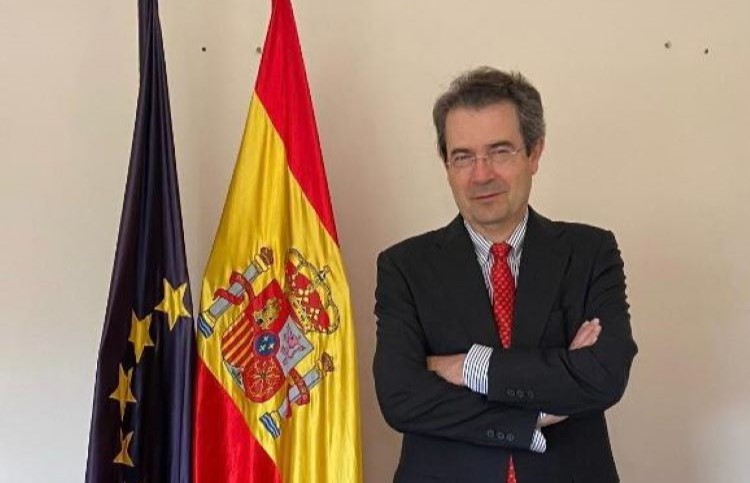Luis Ayllón / Eduardo González
The Council of Ministers yesterday appointed Ramón Santos Martínez as ambassador of Spain to Venezuela, a position that had remained vacant as such since November 2020, when Jesús Silva stepped down.
Santos had held the post of Chargé d’Affaires in Venezuela since November 2021, one year after Silva’s departure and replacing Juan Fernández-Trigo, current State Secretary for Ibero-America and Spanish in the World. Spain had no ambassador, with that rank, in Caracas since November 2020, when it decided to downgrade its diplomatic representation in Venezuela to the level of Chargé d’Affaires with Cabinet Letters, a figure of a lower echelon with which it is shown that relations between the two countries are not fully satisfactory.
Several European Union countries accredited in Caracas did the same to express disagreement with the way the Bolivarian regime organized the last presidential elections, held in 2018. After Silva’s dismissal, Spain sent as Chargé d’Affaires Fernandez-Trigo, who was then serving as ambassador in Cuba. The Minister of Foreign Affairs, José Manuel Albares, offered Santos the possibility of taking charge of the Embassy in Caracas (as Chargé d’Affaires) in November 2021, taking into account his experience in Ibero-American issues.
Venezuela’s representation in Spain has also remained at the Chargé d’Affaires level throughout this time. In early December, the Government of Nicolás Maduro appointed Coromoto Godoy Calderón to this position in Madrid, replacing Mauricio Rodríguez Gelfenstein, who had been in charge of the Embassy since February 2018, following the departure of Ambassador Mario Isea. Everything points to the fact that, in line with the Government of Pedro Sánchez and after the granting of the plácet by Spain, Coromoto Godoy will also be elevated to the rank of ambassador shortly.
Diplomatic sources have indicated to The Diplomat that there are “new circumstances that make it advisable to raise again the representation of Spain in Venezuela to the level of ambassador”. Specifically, they have taken into account the recent resumption of the dialogue in Mexico between the Government and the opposition, which had been stalled for more than a year and which has resulted in “a humanitarian agreement whereby 3 billion dollars will be allocated to improve the conditions of the Venezuelan people”, which “implies that there is an objective improvement in the situation that should be supported by Spain with an appropriate dialogue and at the highest level to interact with both parties”.
Likewise, the fact that some members of the European Union (France and Portugal) have also decided to maintain their representation at ambassadorial level has also been valued. “In the current scenario, Spain cannot see its possibilities of action diminished with respect to other European partners”, the sources specified. Along the same lines, and once the negotiations in Mexico have resumed, Spain “intends to be able to influence, with an adequate level of representation, the opening of the Venezuelan political process”. In this regard, the sources warned that this decision does not imply that Spain has changed “its critical judgment on the 2018 elections”, but that “it seeks that the elections of 2024 be more democratic and allow the opposition to play the role that at the time it could not exercise”.
On the other hand, Spain is one of the countries with the greatest interests in Venezuela (political, economic, energy or consular), “which requires a particularly appropriate level of interlocution at times when important decisions are being made”. In this sense, “the fact that Spain has more than 160,000 nationals in Venezuela, which are necessarily affected by the sanctions, or that the exploitation of Venezuela’s energy resources may be reopened to foreign companies, requires the strengthening of Spain’s official presence”.
Albares has been defending at all times the need for a dialogue-based solution to the political crisis in Venezuela, leading to the holding of free and democratic elections. On November 23, the Government of Spain celebrated the resumption of the negotiation process in Mexico and assured that “Spain will continue working to strengthen the dialogue in this new stage, placing its capacity for dialogue at the service of the parties and contributing to create the necessary conditions for the negotiations to be successful”.
A career diplomat (1986), Santos has been ambassador of Spain in Panama (2015-2019), in Bolivia (2008-2012) and has been posted in the Spanish Embassies in Washington, Brussels-EU and Quito. In the Ministry, he has held, among others, the positions of ambassador in Special Mission for Ibero-American Summits and Multilateral Affairs of Ibero-America, deputy director general of Andean Community Countries, deputy director general of Mercosur countries and Chile, deputy director general of Cooperation with Central American and Caribbean Countries, and chief of staff of the secretary general of the AECID. He was special envoy of the Ministry of Foreign Affairs in Bolivia in December 2019.






